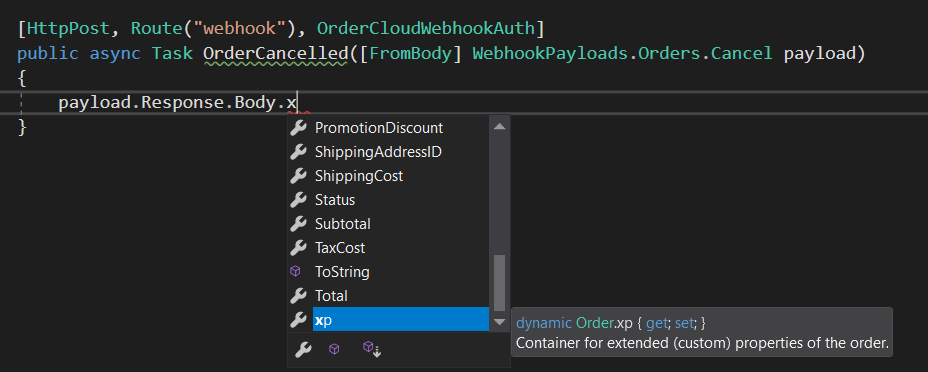A set of extensions and helpers for building ASP.NET Core 2.0 API apps and WebJobs, typically hosted in Azure App Services, that integrate with the OrderCloud.io e-commerce platform.
When a user authenticates and acquires an access token from OrderCloud.io, typically in a front-end web or mobile app, that token can be used in your custom endpoints to verify the user's identity and roles. Here are the steps involved:
1. Register OrderCloud user authentication in your Startup class. You must include one or more OrderCloud.io client IDs identifying your app.
public virtual void ConfigureServices(IServiceCollection services) {
services.AddAuthentication()
.AddOrderCloudUser(opts => opts.AddValidClientIDs("my-client-id"));
...
}Optionally, You may provide one or more required roles in this attribute, any one of which the user must be assigned in order for authorization to succeed.
[HttpGet]
[OrderCloudUserAuth(ApiRole.Shopper, ApiRole.OrderReader, ApiRole.OrderAdmin)]
public Thing Get(string id) {
...
}
[HttpPut]
[OrderCloudUserAuth(ApiRole.OrderAdmin)]
public void Edit([FromBody] Thing thing) {
...
}3. In your front-end app, anywhere you call one of your custom endpoints, pass the OrderCloud.io access token in a request header.
Authorization: Bearer my-ordercloud-token
One of the most common ways to integrate with OrderCloud.io is via webhooks, where your custom endpoints are called directly by OrderCloud, rather than a user app, when some event occurs within the platform. When you configure a webhook, you provide a secret key that is used by OrderCloud to create a hash of the request body and send it in the X-oc-hash header. Your custom endpoint can then check this hash to ensure the authenticity of the call. Here are the steps involved:
1. Register OrderCloud webhook authentication in your Startup class.
You must include your secret key here.
public virtual void ConfigureServices(IServiceCollection services) {
services.AddAuthentication()
.AddOrderCloudWebhooks(opts => opts.HashKey = "my-secret-key");
...
}[Route("webhook")]
[OrderCloudWebhookAuth]
public object HandleAddressSave([FromBody] WebhookPayloads.Addresses.Save<MyConfigData> payload) {
...
}Webhook payload types (such as WebhookPayloads.Addresses.Save above) are defined in the OrderCloud.io .NET SDK.
Some developers find it simpler to configure a single endpoint to handle multiple webhooks in OrderCloud.io. However, by default, ASP.NET Core will only allow you to define one action method per route/HTTP verb, otherwise it will throw an AmbiguousActionException. So developers often resort to a single action method with ugly switch logic to determine which webhook to handle. OrderCloud.AzureApp provides an alternative action selector that inspects the route, HTTP verb, and webhook payload object passed to the method, allowing you to provide an action method per webhook, even if multiple have the same route. Enable this in your Startup class:
public virtual void ConfigureServices(IServiceCollection services) {
...
services
.AddMvc()
.DisambiguateWebhooks();
}If you're using dependency injection, OrderCloud.AzureApp provides a few extension methods you might find useful.
IWebHostBuilder.UseAppSettings<T> allows you to inject a custom app settings object, populated from any configuration source, into any service, or even your Startup class. This should be called in your Program class where you configure the WebHost:
WebHost.CreateDefaultBuilder(args)
.UseAppSettings<AppSettings>() // call before UseStartup to allow injecting AppSettings into Startup
.UseStartup<Startup>()
.Build();Note that this is very similar to the Options pattern in how it maps configuration settings to your AppSettings class, except it bypasses the IOptions<T> indirection and allows you to inject AppSettings directly.
IServiceCollection.AddServicesByConvention is a DI helper that allows you to register many services in a given assembly and (optionally) namespace by naming convention. Call this in your Startup class:
protected virtual void RegisterServices(IServiceCollection services) {
services.AddServicesByConvention(typeof(IMyService).Assembly, typeof(IMyService).Namespace);
...
}This call will scan the assembly/namespace, and for every interface IServiceName with an implementation ServiceName, the following is called implicitly:
services.AddTransient<IServiceName, ServiceName>();If you are writing an integration test that hits an endpoint marked with [OrderCloudUserAuth], you'll need to pass a properly formatted JWT token in the Authorization header, otherwise the call will fail. Fake tokens are a bit tedious to create, so OrderCloud.AzureApp provides a helper:
var token = FakeOrderCloudToken.Create("my-client-id");
httpClient.DefaultRequestHeaders.Authorization =
new AuthenticationHeaderValue("Bearer", token);OrderCloud.AzureApp is a continuous work in progress based entirely on developer feedback. If you're building solutions for OrderCloud.io using ASP.NET Core and find a particular task difficult or tedious, we welcome you to suggest a feature for inclusion in this library.



